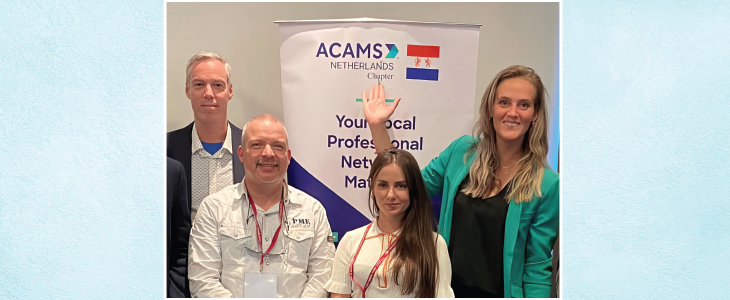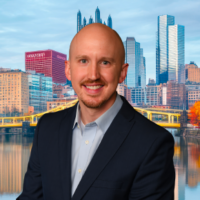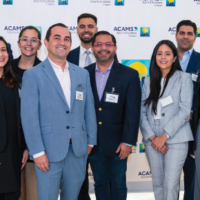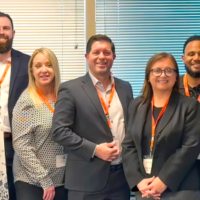
Evelyn Bell, Alexander Verhoeven and Yuri Broodman were active board members of the ACAMS Netherlands Chapter in 2022. They met after an ACAMS Netherlands Chapter event and reflected on their compliance careers as well as their involvement with ACAMS. Since April 2023, Broodman moved to the Luxembourg Chapter, while Bell and Verhoeven are now both co-chairs of the ACAMS Netherlands Chapter Board.
The following are some of the questions posed during their discussion.
ACAMS Netherlands Chapter (ANC): Where did you spend your childhood and what did you study and where?
Evelyn Bell (EB): I grew up in a small town 40 km north of Amsterdam and moved to Amsterdam when I was 18 years old, starting my studies in criminology at Vrije Universiteit in Amsterdam. Taking an interest in both law and human behavior, I expected criminology to be the perfect choice of study for me. After my bachelor’s degree, for which I spent one semester at Northeastern University in Boston, I pursued a master’s degree in criminology at that same university and I did a second master’s degree in forensics, criminology and law as well as criminal defense law at Maastricht University in the south of The Netherlands.
Alexander Verhoeven (AV): Contrary to Bell, I grew up in the south of the Netherlands, near the border of Belgium. While the work conditions were difficult during the 1980s in the Netherlands, my family emigrated to the Republic of South Africa in 1984 to make a living. I lived in George for two and a half years and went to Outeniqua High School, before we emigrated back to the Netherlands in 1987. I then completed my high school in Eindhoven and started with a bachelor’s degree in business administration which I completed in Amsterdam. In October 1992, I started working for De Nederlandsche Bank (DNB), which is the central bank in the Netherlands, in the Monetary Division in downtown Amsterdam.
Yuri Broodman (YB): I spent my childhood in Zeeland, was born in Middelburg and lived in Vlissingen until the age of 19. Having grown up in Zeeland, a quiet province on the seaside in the south of the Netherlands, I had a natural fascination for the sea and when I had to decide what to study, the Royal Netherlands Naval academy was my first choice. As such I went to Den Helder (a three-and-a-half-hour train ride from Vlissingen) and started my studies there to become a navy officer. In 1999, I graduated from the academy and later, during my career in the navy, I did additional studies and obtained an Executive Master of Science Degree in internal auditing (RO) at the University of Amsterdam.
ANC: When did you start working in compliance and what was your first role?
EB: I started my career working for a law firm in international criminal law. After four years, I wanted to work for a large company with many opportunities for growth which I found at KPMG Forensic. With my legal background, I soon focused on anti-money laundering/counter-terrorist financing compliance work, such as supporting clients with running remediation programs. In my first role as a consultant, I reviewed the quality of deliverables (policies and procedures, integrity risk analysis) and acted as a mystery shopper for a money transfer company to assess the level of compliance at different stores.
AV: I think of two events which, for me, were a main factor to start working in the compliance and risk space. On October 4, 1992, a large Israeli cargo plane crashed into a residential flat at the Bijlmer, part of Amsterdam. At that time, I was working as an internal auditor with a focus on the payments department, and from the office we could see the heavy smoke coming from the crash site and saw the images on TV which made a big impression. The September 11, 2001 (9/11) attack was also an event which I will never forget. I had just started working with the supervisory department with the main task of supervising money exchange (forex) and remittance offices like Western Union and MoneyGram. Things changed very fast then, and we had to adapt as supervisors very fast due to new legislation and tasks for DNB. In 2017, I started as a compliance and risk manager with what was at that time still a small payment institution: Pay.nl. This was my first role as dedicated compliance officer for a commercial company.
YB: My first role in compliance was as part of a remediation project team in 2009. I was responsible for conducting a compliance risk assessment and creating a compliance monitoring plan for a private bank in Luxembourg. I had just moved to Luxembourg a few months before and I could use my risk assessment skills which I learned and had used as an internal auditor. After that project assignment, I was hired as senior compliance officer in the compliance department of that same bank and that is how my compliance career started.
ANC: How did you first start working with an ACAMS chapter?
AV: Erik Reissenweber and Niek Röselaers (former board members) asked me to join the chapter as a co-programming director in 2019, something for which I am still grateful. I saw it as an opportunity to engage in a new network and I am still very much enjoying being part of the ACAMS community.
ANC: What is your role within the ACAMS chapter community, and what do you like most about it?
YB: After a few years working in compliance, I wanted to obtain my CAMS designation, which I managed to do so in March 2018. Afterwards, I wanted to do something as part of a local ACAMS community. At the time, I was living in Luxembourg and the chapter there was dormant, so I thought, “Let’s see what can be done about that.” I reached out to Angela Salter with the idea of bringing the local chapter back to life and so it happened. Together with a few other enthusiastic local compliance officers, the ACAMS Luxembourg Chapter was relaunched. In January 2020, just before the pandemic outbreak, there was an inauguration event for the chapter and, for a while, I was the chair of the ACAMS Luxembourg Chapter.
Never stop asking questions, learn and take feedback as an opportunity to grow and learn even more
I mostly liked connecting with fellow anti-financial crime (AFC) colleagues and learning from each other’s experiences. Since 2020, I have seen many younger colleagues joining the ACAMS community which made me realize that compliance as a profession has now really matured.
During 2020-2022, I was part of the ACAMS Netherlands Chapter while working in Amsterdam—and, as previously mentioned, I moved back to the ACAMS Luxembourg Chapter Board in April 2023 as a programming director.
During my time in The Netherlands, I shared previous experiences from the chapter in Luxembourg, and now that I am back in Luxembourg, I am sharing good practices from The Netherlands Chapter. The regional ACAMS community often organizes events, and this is always a great opportunity to share experiences with other chapter members and to learn from each other. I believe that it is truly rewarding to see what can be achieved with a relatively small group of volunteers and to be part of creating the continuous sharing of knowledge and expertise within the AFC community in our countries. It almost goes without saying, but this AFC community stretches from lawmakers and regulators to private and public companies, as well as the many different services providers who make our day-to-day lives in the office easier and more successful to fight financial crime.
ANC: What do you wish to accomplish in the next six to 12 months, both privately and professionally?
EB: My family recently grew with a new baby (a second daughter), so in the next six to 12 months I will have just started working again after maternity leave. I hope to have two happy and healthy girls who enjoy each other’s company, while professionally, I want to work on projects that make a difference. During the past years, the focus of the financial sector has mainly been on becoming compliant with laws and regulations, which remains important. However, by working together across sectors and departments, with different backgrounds and complementary expertise involved, we can contribute to being more effective and focus our efforts on where it is needed the most, to actually prevent financial economic crime from happening.
ANC: What advice would give to younger colleagues currently working in the AFC field?
EB: Never stop asking questions, learn and take feedback as an opportunity to grow and learn even more. Work together with different people, be curious and open to different points of view.
AV: Keep your eyes and ears wide open and do not forget to engage with other compliance and risk professionals. We need each other to survive as professionals and as legislation is changing fast. The current situation in the world will also give us a lot of opportunities as professionals, which will hopefully lead to a better world. Environmental, social and governance is, for example, making progress, but a lot of work still needs to be done. Compliance professionals can really make a difference!
YB: Stay curious and never stop learning. Also engage with your colleagues from other risk disciplines, legal, etc. as a better way to deal with all the challengers ahead. A saying often used and quite inspiring is: “We will either succeed collectively or fail individually.” There are obviously many other teamwork-related quotes which all are true in their own way, but the bottom line in my view is that we can all learn from each other, can achieve so much more if we work collectively toward the same goals, and while doing so, we should never be afraid to ask for help from another team member, friend, current or former colleague or an ACAMS community member.
ACAMS Netherlands Chapter Board










